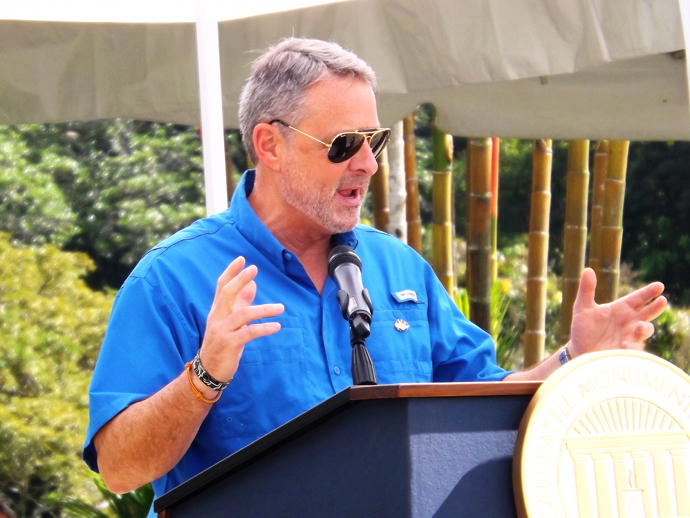Former US ambassador in Panama John Feeley, at the Veterans Day observance at the Corozal American Cemetery in November of 2017. By that time it had not been announced, but Feeley, disgusted with Donald Trump’s racism, was on his way out of the diplomatic corps. But still at that time, if we are to believe the Varela leaks, he and the US government were still concerned with the ownership of Panamanian media and with stripping Abdul Waked of assets even though his Colombian nephew, who was the one accused of drug money laundering, had beaten that charge in the US courts. Archive photo by Eric Jackson.
Ambassador’s communications intercepted, revealing
US concern about ownership of Panamanian media
by Eric Jackson
It’s more than 24 gigabytes of material, not so well indexed on a website coming out of the United States. They’re calling it #VarelaLeaks and we are likely to be reading and hearing about it for months to come. These are WhatsApp text messages between former president Juan Carlos Varela and many other people. Varela admits that the communications are mostly his, but says that they have been edited and partly falsified for political purposes.
The initial claim is that Varela lost a cell phone, which someone recovered along with his text messages. But the former president says that no cell phone of his was lost or stolen. Moreover, that’s a lot of material to store forever on one portable device. Varela is blaming his predecessor Ricardo Martinelli and people aligned with him of hacking into his communications, using Israeli equipment and Israeli and Italian programs — the Pegasus system that has been getting a lot of international notoriety lately.
Pegasus is especially in the limelight of Facebook’s US lawsuit against the Israeli government backed NSO Group, which developed the malware program Pegasus and the equipment used to deploy it. The name derives from the software but that and the specialized equipment used to run it are sold as a package. That suit, filed in late October by Facebook, the owner of WhatsApp, accuses the Israeli company of commandeering the Internet communications, computers and cell phones of at least 1,400 people through their use of WhatsApp. This, Facebook claims, is in violation of US patent and copyright laws, people’s ownership rights to their Internet devices and US and California privacy laws. The NSO Group, often described as “shadowy,” is thought to be a spinoff of Israeli intelligence, known to have Israeli government backing for its exports, and has a sordid reputation for providing eavesdropping capabilities to authoritarian regimes around the world. Controlling interest in the company was bought in 2014 by a US hedge fund, Francisco Partners Management.
One of NSO’s hoodlum regime clients was the Martinelli administration in Panama. The equipment that Martinelli used to spy on an identified 150 people but at least several thousand, was bought at government expense along with its programs, then in the wake of the 2014 Martinelista election defeat removed from the National Security Council premises on Andonc Hill where it had been set up and used. It was, according to court witnesses whose testimony was discarded under an extra-legal pretext that sprung the former president from custody, last seen in Ricardo Martinelli’s private company office in Paitilla.
The leaks receiving the most attention are those most unflattering to Ricky Martinelli’s political foes. In addition to Varela’s specific claims it suggests who is behind the leaks. Some of these, if they are genuine, would be damning to Varela and to Attorney General Kenia Porcell. They detail exchanges of text messages about prosecutorial matters in which presidents are not supposed to interfere and prosecutors are not suppose to talk about with politicians. A particularly explosive set of allegations is that former president Varela and his brother intervened with Porcell to broker a plea bargain with the corrupt Brazilian company Odebrecht, which allowed the latter to continue doing business with Panamanian government entities despite guilty pleas to bribery and kickback schemes here and elsewhere.
Another legal problem discussed in the leaked text messages was one brought up on the Panamanian government by Washington’s prosecution of Nidal Waked and blacklisting of him and his uncle and their business properties. With great fanfare it was hailed by the DEA and the US Treasury Department as the bust of a major drug money laundering operation. What was proven in court is that Nidal Waked took a loan from a Chinese bank for one purpose, used the money for another purpose and paid back the loan. No drug connection of any sort was every shown against any of the Wakeds or any of their businesses. But Varela fell into lock step with Washington, stripping the Wakeds of licenses and concessions, calling in loans from state-owned banks and forcing quick sales in soft markets. Which then had Abdul Waked suing the Panamanian government for the losses its actions caused him and his businesses, and a nervous Varela asking the American ambassador — in text message conversations — about what proofs Panama might show to defend itself. (Waked’s lawsuit was later dismissed.)
Varela also complained to Feeley that the US sanctions that forced Abdul Waked to sell his controlling interest in the La Estrella and El Siglo newspapers had resulted in its purchase by prominent figures in the PRD. Feeley pointed out that Panameñistas might as well have bought it, but that the US interest in the matter was to avoid having La Prensa as the one major Panamanian daily newspaper that remained.
Who owns and sets editorial policies for which media is, of course, a major concern for the Trump administration on both domestic and international levels. Well before Trump’s time the US government took an interest in promoting some media and denigrating others in the English-speaking community here. For years the US Embassy has not answered questions or returned calls by The Panama News, nor directly sent press releases, because, as a consul at the time stated, “we don’t represent the same interests.” Given much history over many years, Feeley’s concern about La Prensa dominating the news business here is ironic to this reporter.
Given the Trump rants about Hillary Clinton and her allegedly lax Internet security, and given the acrimony of Feeley’s departure from the State Department, perhaps we will get some Trump tweets about Feeley’s insecure text messaging with Varela. Perhaps we will get some explanations or denials from Feeley, who cited Trump’s statement about some Nazis being fine people as an intolerable last straw compelling his departure. The current US president’s vitriol against all Hispanic people surely would have in itself offended Feeley, whose wife is Puerto Rican and also a former US diplomat. And where did the former ambassador go from here? To a journalism job with the Spanish-language Univision network.
We may see or hear more Feeley angles in the Varela leaks story.
Contact us by email at fund4thepanamanews@gmail.com
These links are interactive — click on the boxes













